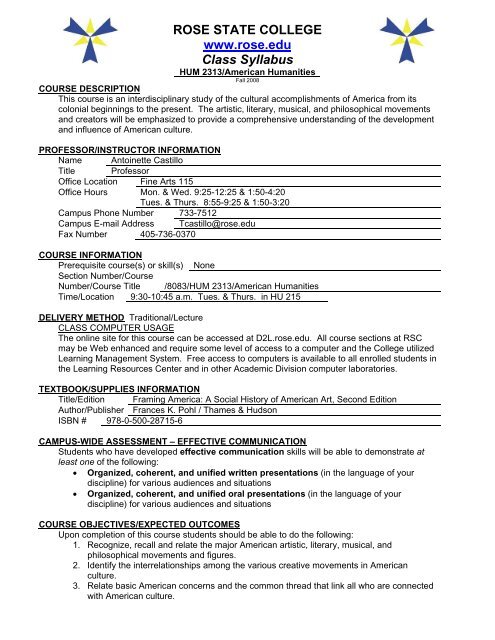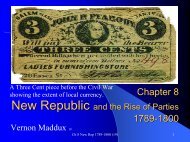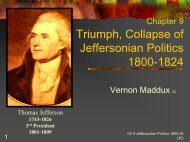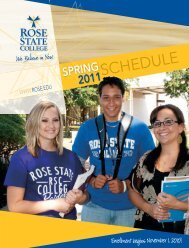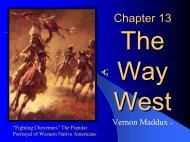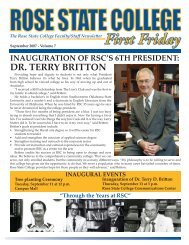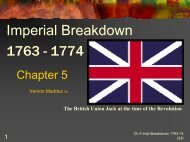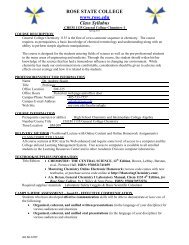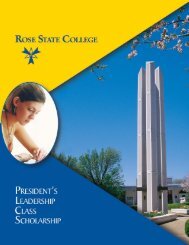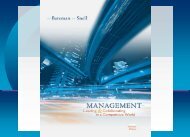You also want an ePaper? Increase the reach of your titles
YUMPU automatically turns print PDFs into web optimized ePapers that Google loves.
ROSE STATE COLLEGE<br />
www.rose.edu<br />
<strong>Class</strong> <strong>Syllabus</strong><br />
HUM 2313/American Humanities<br />
Fall 2008<br />
COURSE DESCRIPTION<br />
This course is an interdisciplinary study of the cultural accomplishments of America from its<br />
colonial beginnings to the present. The artistic, literary, musical, and philosophical movements<br />
and creators will be emphasized to provide a comprehensive understanding of the development<br />
and influence of American culture.<br />
PROFESSOR/INSTRUCTOR INFORMATION<br />
Name Antoinette Castillo<br />
Title Professor<br />
Office Location Fine Arts 115<br />
Office Hours Mon. & Wed. 9:25-12:25 & 1:50-4:20<br />
Tues. & Thurs. 8:55-9:25 & 1:50-3:20<br />
Campus Phone Number 733-7512<br />
Campus E-mail Address Tcastillo@rose.edu<br />
Fax Number 405-736-0370<br />
COURSE INFORMATION<br />
Prerequisite course(s) or skill(s) None<br />
Section Number/Course<br />
Number/Course Title /8083/HUM 2313/American Humanities<br />
Time/Location 9:30-10:45 a.m. Tues. & Thurs. in HU 215<br />
DELIVERY METHOD Traditional/Lecture<br />
CLASS COMPUTER USAGE<br />
The online site for this course can be accessed at D2L.rose.edu. All course sections at RSC<br />
may be Web enhanced and require some level of access to a computer and the <strong>College</strong> utilized<br />
Learning Management System. Free access to computers is available to all enrolled students in<br />
the Learning Resources Center and in other Academic Division computer laboratories.<br />
TEXTBOOK/SUPPLIES INFORMATION<br />
Title/Edition Framing America: A Social History of American Art, Second Edition<br />
Author/Publisher Frances K. Pohl / Thames & Hudson<br />
ISBN # 978-0-500-28715-6<br />
CAMPUS-WIDE ASSESSMENT – EFFECTIVE COMMUNICATION<br />
Students who have developed effective communication skills will be able to demonstrate at<br />
least one of the following:<br />
• Organized, coherent, and unified written presentations (in the language of your<br />
discipline) for various audiences and situations<br />
• Organized, coherent, and unified oral presentations (in the language of your<br />
discipline) for various audiences and situations<br />
COURSE OBJECTIVES/EXPECTED OUTCOMES<br />
Upon completion of this course students should be able to do the following:<br />
1. Recognize, recall and relate the major American artistic, literary, musical, and<br />
philosophical movements and figures.<br />
2. Identify the interrelationships among the various creative movements in American<br />
culture.<br />
3. Relate basic American concerns and the common thread that link all who are connected<br />
with American culture.
GRADING SCALE<br />
1000 points are possible in the course. Grades are determined based on the following point<br />
spread: A = 900-1000 B = 800-899 C = 700-799 D = 600-699 F = 599 or less<br />
READING QUIZZES: 150 POINTS POSSIBLE<br />
Each week a quiz is given over the reading assigned for that week in order to reinforce<br />
important concepts in the textbook and to help students prepare for class discussion. Each quiz<br />
has from one to three questions on it; the questions are taken directly from those listed on the<br />
Chapter Reading Guides. Each question is worth up to five possible points depending on the<br />
development of the answer.<br />
If a quiz is missed, students may come by my office hours to make it up for full credit as long<br />
as it is made up before the next class period. After that, the quiz cannot be made up for credit<br />
because the other students’ quizzes will have been returned and the answers reviewed in class.<br />
IN-CLASS APPLICATION WORK: 150 POINTS POSSIBLE<br />
A dialogue based learning approach is used in this class. The focus is on questioning, exploring,<br />
clarifying values and assumptions, and using hands-on activities to reinforce this process.<br />
These activities are worth 5 points each. Some days may have more than one credited activity;<br />
a few days may have none.<br />
Since the exercises are context based, they cannot be made up if missed.<br />
WEEKLY ANALYSIS PAPERS: 600 POINTS POSSIBLE<br />
Twelve directed writings are required this semester. These are written in response to specific<br />
questions and are an opportunity for students to demonstrate knowledge and further explore<br />
concepts worked on in class. Each of these papers should be around 300 words (That’s around<br />
one full page typed, double-spaced, 12 font, with about 1” margins.) Up to two of these<br />
assignments will be accepted up to one week late without penalty.<br />
They will not be accepted later than one week past the due date, and no more than two will be<br />
accepted late.<br />
FINAL EXAM 100 POINTS<br />
The final exam will consist of two parts. The first half, worth 50 points, will be multiple choice.<br />
Students will demonstrate knowledge of key cultural literacy terms presented during the<br />
semester. (A study guide listing these terms will be provided.) In the second half, worth the<br />
other 50 points, students will analyze a cultural artifact from the 21 st century using analysis<br />
methods taught during the semester.<br />
This test cannot be made up if missed; however, if a student notifies me before the final exam<br />
time, arrangements can be made to take it in the LRC Testing Center.<br />
Extra Credit Opportunities: Two opportunities for extra credit are available each week through<br />
the semester. They include a variety of possibilities, such as visiting museums, photographing<br />
local architecture, watching selected movies or television shows, reading selected books or<br />
essays, and attending selected cultural events. These opportunities, along with the due dates<br />
and possible point values for each one, are announced in class and posted in the calendar on<br />
our course D2L online site.<br />
Service Learning: A student may contract to do a minimum of 12 hours of service learning at<br />
an approved agency, and write six guided critical responses to that experience in place of six of<br />
the extra credit options I announce or post in class. If you are interested in this option, please<br />
contact me by the end of the second week of class.<br />
Honors Contracts: I encourage any student who is interested in pursuing an honors contract in<br />
this course to talk with me about creating one. If you are interested, highly self-motivated, and<br />
are sure you have the time to devote to such a project, please contact me by the end of the<br />
second week of the semester.<br />
AA 36-12’07
IMPORTANT DATES TO REMEMBER<br />
Last day to November 7, 2008<br />
withdraw<br />
Final 9:30-11:20 a.m., Thursday, December 11<br />
COURSE POLICIES<br />
(May include but is not limited to:)<br />
STUDENT RESPONSIBILITIES<br />
Attendance: Regular attendance in this course is necessary. In the classroom we work to<br />
create knowledge and understanding as a group, so this cannot be made up individually. Be<br />
sure you are familiar with the late work policies listed above in the grading scale.<br />
Note: Please do not call the Humanities Division main office to discuss an absence; instead,<br />
contact me through D2L or use the professor contact information listed in this syllabus if<br />
necessary.<br />
Please do not call the college to check on closings due to bad weather; tune into television or<br />
radio news broadcasts or contact me.<br />
PROFESSOR RESPONSIBILITIES<br />
If you find the time and instruction given during class hours for this course are not enough for<br />
you, that is, if you are having difficulty doing the assignments or understanding any part of what<br />
we are doing in the class, please talk with me about your problems. This is especially true if you<br />
don’t understand WHY we are focusing on the things we are in class; I don’t want to ever waste<br />
your time. At any time, you may come by my office hours, schedule an appointment at another<br />
time, e-mail me, fax me, or contact me by phone. It is part of my job to give individual<br />
instruction as needed and also very important to me, personally, that this class is a worthwhile<br />
experience for each of you.<br />
RECOMMENDED STUDY METHOD(S)<br />
1. Do not miss class if you can possibly help it.<br />
2. There is a lot of reading in this class. Be sure to schedule plenty of time for it and to<br />
stick to your schedule.<br />
3. Use the Reading Guides for each chapter, so you can make notes on it to help you study<br />
for the quizzes.<br />
4. Schedule at least two hours to write each of the twelve directed writings. The focus in<br />
these is on critical thinking, so be sure you have read the assignment carefully and are<br />
responding directly to it. If your response is much less than one full page, review it to<br />
see if your analysis can be made more complex. If you have any concerns about the<br />
quality of the response, send a draft to me through D2L for input.<br />
5. Take advantage of the extra credit.<br />
INSTITUTIONAL GRADING POLICIES<br />
Please note that the grade of W can be assigned only if the student officially withdraws from the<br />
course. The grade of AU for audit is not an option in this course.<br />
A student may request a grade of I (Incomplete) only when an emergency situation affects the<br />
last days of the semester. The student MUST BE PASSING at the time of the request. Should<br />
circumstances merit an I, the student and instructor will contract a plan to include work missed<br />
and a timeline for work to be completed before the end of the following semester; if the work is<br />
not completed by that time, the grade will automatically convert to an F.<br />
AA 36-12’07
STUDENT SUPPORT SERVICES<br />
<strong>Rose</strong> <strong>State</strong> <strong>College</strong> complies with Section 504 of the Rehabilitation Act and the Americans with<br />
Disabilities Act. Students with disabilities who seek accommodations must make their request by<br />
contacting the Office of Disabilities Services, located in LRC 125 or call 733-7407. The student will be<br />
asked to provide documentation concerning the disability. All accommodations must be approved by the<br />
Office of Disability Services.<br />
Academic Integrity<br />
STUDENT POLICIES<br />
<strong>Rose</strong> <strong>State</strong> <strong>College</strong> expects students to understand and to follow basic standards of honesty and<br />
integrity. Some common violations of these basic standards of academic integrity include but are not<br />
limited to, plagiarism, cheating on tests and examinations, presenting work completed for one course as<br />
original work for another, and other forms of dishonest performance on college assignments, as explained<br />
below.<br />
Plagiarism means the use of the thoughts, ideas, words, phrases or research of another person or source<br />
as one's own without explicit and accurate credit to the original author.<br />
Cheating on examinations of any kind (quizzes, midterms, finals, etc.) includes copying another student's<br />
answers, exchanging information, using notes or books unless expressly permitted to do so by the<br />
instructor, or gaining access to examinations prior to the actual taking of such examinations.<br />
Other examples of academic dishonesty include, but are not limited to, copying or preparing another<br />
person's work; or buying prepared papers.<br />
Assisting anyone to engage in any of the violations described above qualifies as academic dishonesty.<br />
All rules and standards of academic integrity apply equally to all electronic media, particularly all intranet<br />
and internet activities. This is especially true for any form of plagiarism, ranging from submission as one's<br />
own all or part of a paper obtained from an internet source to failure to cite properly an internet source.<br />
AA 36-12’07
AA 36-12’07<br />
TENTATIVE CLASS CALENDAR/Course Outline<br />
Session <strong>Class</strong> Focus Reading Completed Due<br />
Aug. 19 Introduction<br />
Aug. 21 Architecture Fundamentals<br />
Aug. 26 Semiotics: Images & Power Textbook Chap. 1<br />
Aug. 28 Puritan Roots Quiz 1<br />
Sept. 2 Art Fundamentals; Federalism Textbook Chap. 2 Analysis 1<br />
Sept. 4 Neoclassicism; Early Am Lit Quiz 2<br />
Sept. 9 Landscapes & Romanticism Textbook Chap. 3 Analysis 2<br />
Sept. 11 Transcendentalism &<br />
Civil Disobedience<br />
Civil Disobedience Quiz 3<br />
Sept. 16 Roots of American Music Textbook Chap. 4 Analysis 3<br />
Sept. 18 Images, Media, & Culture Quiz 4<br />
Sept. 23 Gilded Age Literature & Pragmatism Textbook Chap. 5 Analysis 4<br />
Sept. 25 Realism: Elkins & Chicago School Quiz 5<br />
Sept. 30 20 th Cent. Ideas; Whitman Textbook pgs. 319-357 Analysis 5<br />
Oct. 2 Modernism Modern Lit. Handout Quiz 6<br />
Oct. 7 Modern Art & Dance Textbook pgs. 357-384 Analysis 6<br />
Oct. 9 Harlem Renaissance Quiz 7<br />
Oct. 14 Art & Government Textbook pgs. 385-428 Quiz 8<br />
Oct. 16 FALL BREAK<br />
Oct. 21 Drama Textbook pgs. 429-452 Analysis 7<br />
Oct. 23 Abstract Expressionism Quiz 9<br />
Oct. 28 Pastiche & Parody; Beat Movement Textbook pgs. 453-482 Analysis 8<br />
Oct. 30 Minimalism Quiz 10<br />
Nov. 4 Pop Art Textbook pgs. 482-505 Analysis 9<br />
Nov. 6 Protest Art Quiz 11<br />
Nov. 11 Feminist Art Textbook pgs. 505-523 Analysis 10<br />
Nov. 13 Public Art Quiz 12<br />
Nov.18 Postmodernism/Architecture Textbook pgs. 523-533 Analysis 11<br />
Nov. 20 Postmodern Art Quiz 13<br />
Nov. 25 Art & Activism Textbook pgs. 533-546 Quiz 14; Analysis 12<br />
Nov. 27 THANKSGIVING HOLIDAY<br />
Dec. 2 Culture Wars Textbook pgs. 546-562<br />
Dec. 6 21 st Century Vision Quiz 15<br />
Dec. 11<br />
Final Exam; Thursday, 9:30-11:20


